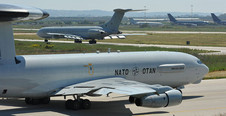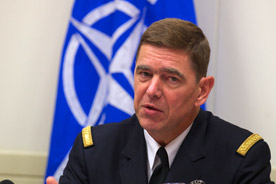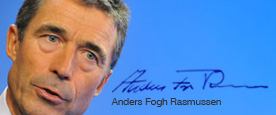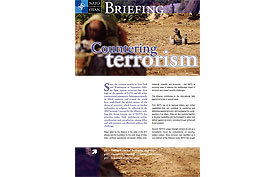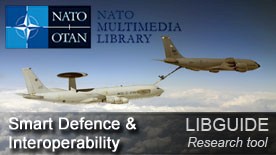Smart Defence
Newsroom
- NATO Defence Ministers determined to improve capabilities, cooperation
-
NATO supports Smart Defence in South-Eastern Europe
03 Oct. 2012
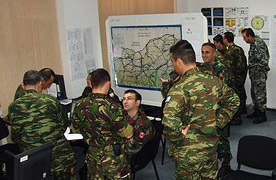
The NATO Communications and Information (NCI) Agency will support efforts to sustain the multinational South-Eastern Europe Brigade in carrying out a wide range of missions, including disaster management, and ensure full interoperability with NATO in operations. The support package was reviewed by sixteen defence ministers at the South- Eastern Europe Defence Ministerial (SEDM) in Sarajevo, Bosnia and Herzegovina, on 3 October.

- Supreme Allied Commander Transformation briefs the press on Smart Defence
NATO Secretary General and Smart Defence
PDF Library
- Media Backgrounder - Multinational Projects
PDF / 257.23 kb - Media backgrounder: NATO Ballistic Missile Defence (BMD)
PDF / 1416.61 kb - Media backgrounder: Allied Ground Surveillance (AGS)
PDF / 278.04 kb - Smart Defence - Smart Tadic - 14 Oct 2011 - Background paper
PDF / 547.86 kb - Smart Defence - Smart Tadic- 14 Oct 2011 - Report
PDF / 758.66 kb - NATO Active Layered Theatre Ballistic Missile Defence (ALTBMD) (PDF/278Kb) - Media Backgrounder
Photo Galleries
Opinions
- Video tele-conference message by NATO Secretary General Anders Fogh Rasmussen for the NATO Industry Day 2012, Riga, Latvia15 Oct. 2012
- Press briefing by General Stéphane Abrial, Supreme Allied Commander Transformation (SACT)12 Sep. 2012
- ''A global perspective for Europe'' - Address by NATO Secretary General Anders Fogh Rasmussen to the joint meeing of the European Parliament’s Committee on Foreign Affairs and Sub-committee on Security and Defence23 Apr. 2012
NATO Review
Publications
Links
- The NATO Communications and Information Agency (NCIA)
- ACT - Website of Allied Command Transformation
- Active Layered Theatre Ballistic Missile Defence (ALTBMD) Programme - Website
- Heavy Airlift Wing (HAW)
- Multinational Sealift Steering Committee (MSSC)
- The NATO Procurement Organisation (NPO)
- NATO Airlift Management Agency (NAMA)
- NATO Airborne Early Warning and Control Force (E3A)
- NATO Maintenance and Supply Agency (NAMSA)
Last updated: 12-Sep-2012 18:15
Natochannel.tv
-
 Press briefing by Supreme Allied Commander Transformation
Press briefing by Supreme Allied Commander Transformation
12 Sep. 2012
-
 A leaner, more affordable NATO
A leaner, more affordable NATO
26 Jul. 2012
-
 Keeping an eye on the ball
Keeping an eye on the ball
09 Jun. 2012
-
 Air Policing - Smart Defence at Work
Air Policing - Smart Defence at Work
05 Apr. 2012
-
 Cooperating to save lives
Cooperating to save lives
02 Mar. 2012
Topics
Specific aspects:
- Alliance Ground Surveillance (AGS)
- AWACS: NATO’s 'Eye In The Sky'
- Countering Improvised Explosive Devices (C-IEDs)
- Conference of National Armaments Directors (CNAD)
- Defending against cyber attacks
- Improving NATO’s strategic air- and sealift capabilities
- Ballistic missile defence
- NATO Integrated Air and Missile Defence
- NATO Air Command and Control System (ACCS)
- Strategic Airlift Capability (SAC)
- Strategic Airlift Interim Solution (SALIS)
Topics
General background:

